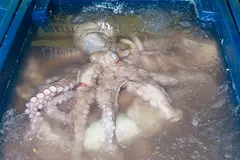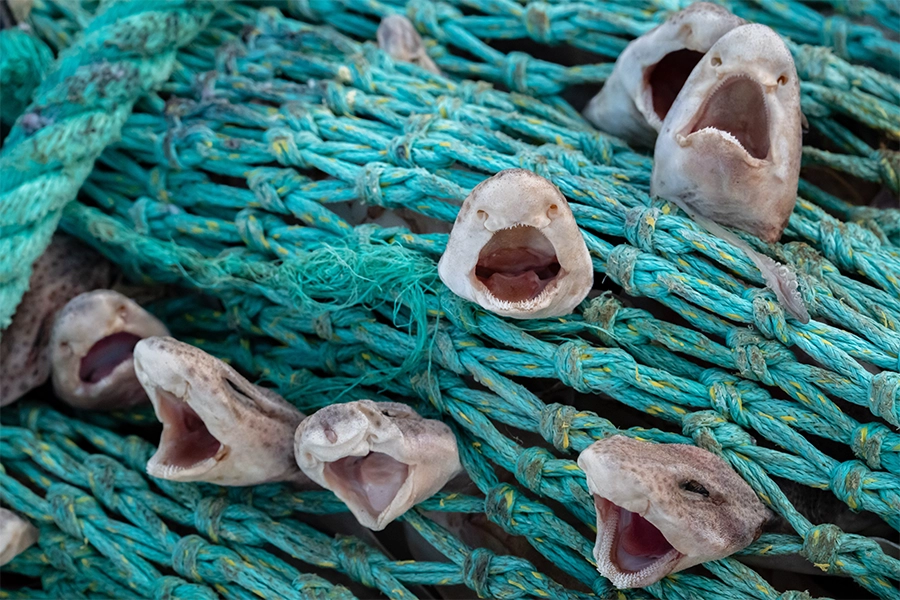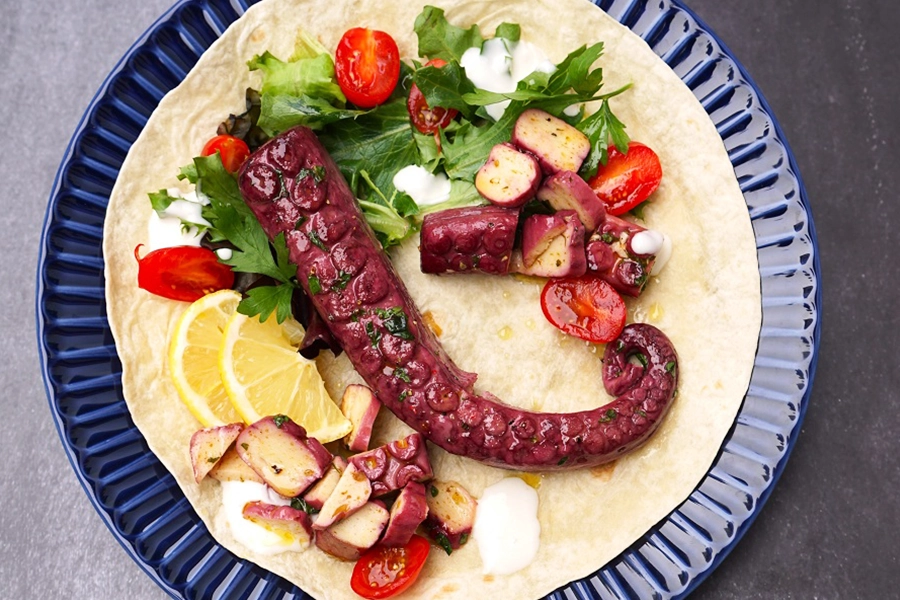
- Industry news
Industry news
- Category news
Category news
- Reports
- Key trends
- Multimedia
- Journal
- Events
- Suppliers
- Home
- Industry news
Industry news
- Category news
Category news
- Reports
- Key trends
- Multimedia
- Events
- Suppliers
World Octopus Day 2025: Animal rights group exposes carnivorous aquaculture threats
Key takeaways
- Compassion in World Farming warns that octopus farming would cause severe animal suffering.
- The report highlights that carnivorous aquaculture like octopus farming puts heavy pressure on wild fish stocks.
- Animal rights groups urge the EU to adopt a coordinated ban, following the example of US states.

Compassion in World Farming (CIWF) has published a report warning of the growing threat of octopus farming on animal welfare, food security, and marine ecosystems. Published today on World Octopus Day, the report says carnivorous aquaculture (feed-dependent aquatic animal farming) puts unsustainable strain on already overexploited wild fish stocks.
The “Growing Threat of Carnivorous Aquaculture” report comes amid Nueva Pescanova’s proposal to open the world’s first octopus farm. The Spanish company’s initial proposal was rejected by the Canary Islands government in April 2024, with authorities concluding that the farm would pose a “significantly high” risk to marine life, local water, and air quality.
Although the company has not taken further steps publicly since then, it is entitled to submit a revised proposal.
There are moves to ban octopus farming in Spain, where consumption of the highly sentient animal remains popular. In May 2024, a legislative proposal was submitted to the Spanish Congress aimed at halting octopus farming, which is expected to be debated later this year.
“These efforts reflect a growing recognition of the risks associated with octopus farming. There is an opportunity for Europe to develop a consistent and coordinated position on the issue, which is why we are calling on policymakers to support a ban,” Dr. Elena Lara, senior research and policy adviser at CIWF, tells Food Ingredients First.
Animal suffering exposed
CIWF has also released new undercover footage of the slaughter method Nueva Pescanova plans to use in its proposed octopus farm. The footage of wild-caught octopuses shows the animals suffering slow and agonizing deaths by being submerged in icy water, where they take at least ten minutes to die.
“Our footage clearly shows what we have always said — that it is simply not possible to slaughter farmed octopuses in a humane way,” says Lara.
Nueva Pescanova previously told us that its chosen slaughter method would “involve proper handling that avoids any pain or suffering to the animal.”
Animal rights activists argue that it will never be possible to farm sentient creatures like octopuses ethically. The Spanish company insists that “there is no scientifically validated knowledge about their ‘intelligence’ or whether they are more intelligent than other marine species already farmed.”
The EU currently provides no protection to octopuses in farming conditions, but the European Commission is expected to revise and extend its animal welfare regulation to include cephalopods. Environmental groups warn that octopus farming could devastate marine ecosystems and threaten global food security.
Environmental groups warn that octopus farming could devastate marine ecosystems and threaten global food security.
Global food security
The new report warns that expanding the seafood industry by introducing new species like octopus will weaken the resilience of marine ecosystems and global food security. It says that feed for farmed fish and octopus would be taken from vital forage fisheries in West Africa, South America, and Southeast Asia, posing a serious threat to local diets and livelihoods.
CIWF estimates that Nueva Pescanova’s farm could require up to 28,000 tons of wild-caught fish in its first year to produce only 3,000 tons of octopus meat — equivalent to two billion individual fish used for feed.
“The expansion into octopus farming would harm access to fish for coastal communities in the Global South, feeding private profits and premium markets, instead of the people who need it the most,” says Lara.
“It’s clear that our future food security depends upon systemic change. Plant-based alternatives from innovative companies such as Revo Foods have a key role to play as we reduce our meat intake, especially in the Global North.”
Nueva Pescanova said in 2023 that the octopuses would be fed a diet that “uses discards and by-products of already-caught fish not intended for human consumption” and that the project “guarantees the sustainability of the species and responds to a growing demand for seafood.”
CIWF estimates that carnivorous aquaculture in the EU is projected to grow 30% by 2040, while the demand for wild-caught fish in the EU could rise by 70% by 2040. Europe has added 78 new farmed species since 1985 — 70% of them needing animal-based feeds.
A multilateral agreement under the World Trade Organization, aimed at phasing out harmful fisheries subsidies and enhancing the sustainability of marine resources, entered into force last month. Plant-based seafood innovators like Revo Foods are offering sustainable alternatives to octopus farming, promoting ethical and eco-friendly protein sources.
Plant-based seafood innovators like Revo Foods are offering sustainable alternatives to octopus farming, promoting ethical and eco-friendly protein sources.
Research or exploitation?
Earlier this year, the Spanish government approved an octopus hatchery permit for multinational fishing business Grupo Profand.
The company claims that the primary objective of this project phase is to optimize the larval phase of the common octopus, “without the aim of production or commercialization.” However, the project description in its permit request states that the research is intended for “industrial exploitation.”
“Regardless of the company’s intentions, such research could advance knowledge on the captive breeding of octopuses for future aquaculture purposes — an unethical and unsustainable practice that would have devastating impacts on these unique, intelligent creatures,” says Lara.
CIWF urges policymakers to back the global “Keep Them Wild” pledge to protect octopuses from industrialized farming.
In June, US senators reintroduced a federal bill to prevent the commercial farming of octopuses and the importation and sale of commercially-farmed octopuses. Washington and California states already have active bans in place.
Keri Tietge, an octopus project consultant at Eurogroup for Animals, previously told us that the US bans should send a strong signal to the EU, which is widely regarded as the global leader in animal welfare legislation.











